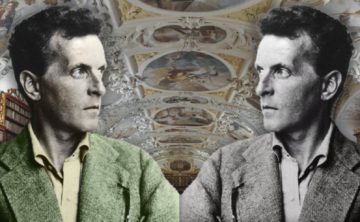Lee Braver at IAI News:
 Few philosophers have given rise to an entire movement, far fewer to two. Along with Heidegger, Wittgenstein counts among this select number in the 20th Century. Wittgenstein capped his early career with the Tractatus Logico-Philosophicus, a dense cryptic book whose truth he found “unassailable and definitive” in finding “on all essential points, the final solution of the problems” (T Preface)–until he came back years later to assail its solutions. He returned to give not just different solutions, but an entirely different take on the nature of knowledge, reality, and what philosophical views about such matters must be like. These two phases of his thought shaped much of roughly the first half of analytic philosophy’s history. The Tractatus brings Frege, Russell, and Moore’s logicism to its culmination and inspired the Vienna Circle. His later work, generally represented by the posthumous Philosophical Investigations, is a foundational work of the ordinary language philosophy practiced by Austin and Ryle and, despite his personal hostility to naturalism, contains elements that pushed analytic thought in that direction where Quine and others then took over. One of the central topics Wittgenstein changed his mind about was on the question of realism – whether we can know the world as it really is and whether our language can map onto reality.
Few philosophers have given rise to an entire movement, far fewer to two. Along with Heidegger, Wittgenstein counts among this select number in the 20th Century. Wittgenstein capped his early career with the Tractatus Logico-Philosophicus, a dense cryptic book whose truth he found “unassailable and definitive” in finding “on all essential points, the final solution of the problems” (T Preface)–until he came back years later to assail its solutions. He returned to give not just different solutions, but an entirely different take on the nature of knowledge, reality, and what philosophical views about such matters must be like. These two phases of his thought shaped much of roughly the first half of analytic philosophy’s history. The Tractatus brings Frege, Russell, and Moore’s logicism to its culmination and inspired the Vienna Circle. His later work, generally represented by the posthumous Philosophical Investigations, is a foundational work of the ordinary language philosophy practiced by Austin and Ryle and, despite his personal hostility to naturalism, contains elements that pushed analytic thought in that direction where Quine and others then took over. One of the central topics Wittgenstein changed his mind about was on the question of realism – whether we can know the world as it really is and whether our language can map onto reality.
More here.
